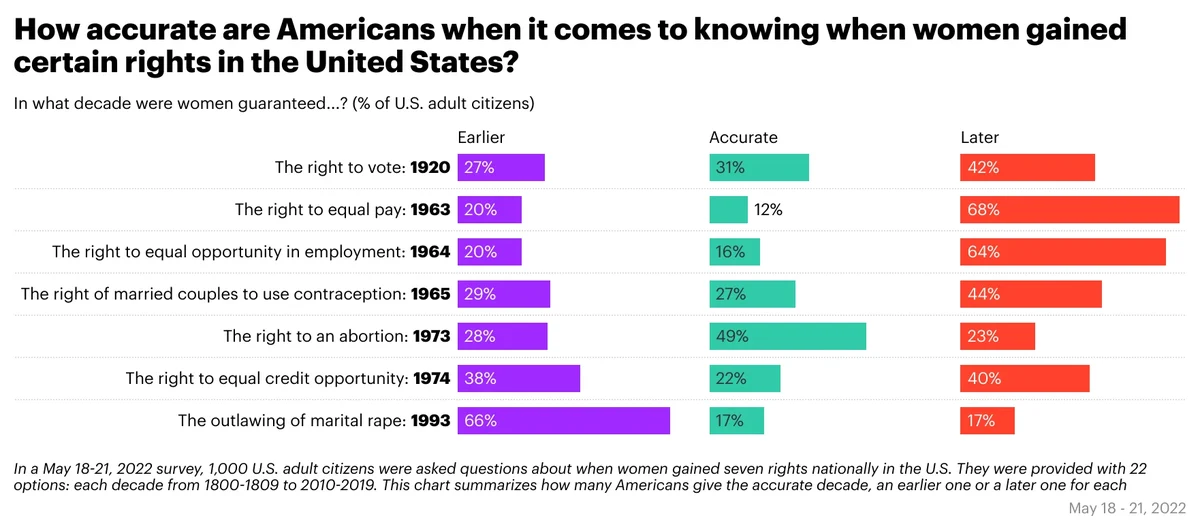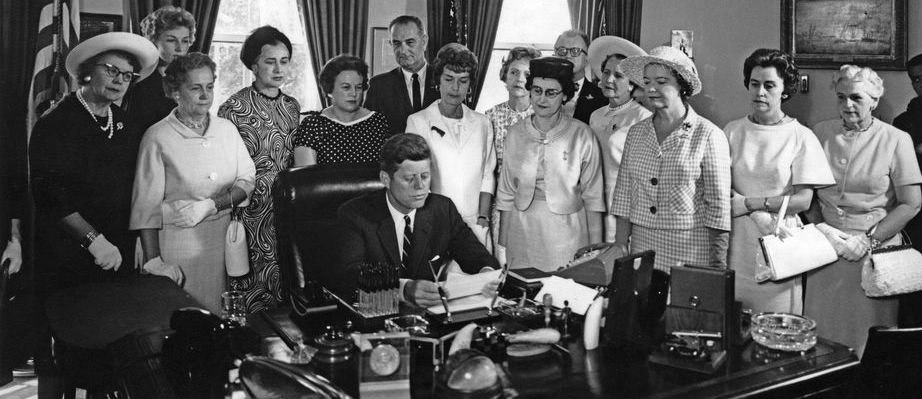The battle for women’s rights in the United States, which began over a century ago and continues today, has been a long and winding road. But how much do Americans today know or remember about this journey? In a recent poll, we tested people's knowledge of when women were guaranteed seven rights in the United States.
On none of the seven can as many as half of Americans provide the correct decade; on many, far fewer than half can. Many Americans, though still less than half, are aware of the decade in which women were nationally granted the right to vote (1920) and the right to have an abortion (1973). Far fewer know when American women were guaranteed other rights, including three rights women gained nationally in the 1960s: equal pay (1963), equal opportunity in employment (1964), and using contraception within marriage (1965).
One caveat is that while we dated each right to when it was broadly applied, there are exceptions to many. For instance, employers with fewer than 15 employees may still discriminate against workers on the basis of sex in some circumstances. And, while Roe v. Wade is still technically in place, some states have recently enacted total or near-total abortion bans. Furthermore, not all states currently treat marital and non-marital rape equally.
Here's how Americans' estimates of when women gained seven rights compare to when those rights were gained nationally:
1920: The right to vote in national elections
The Nineteenth Amendment to the U.S. Constitution, which granted women the national right to vote, was ratified in 1920. It reads, “The right of citizens of the United States to vote shall not be denied or abridged by the United States or by any State on account of sex.” Nearly one in three Americans (31%) are able to accurately provide the period in which the right to vote was gained, while 27% give an earlier decade and 42% provide a later one.
1963: The right to equal pay
In 1963 John F. Kennedy signed into law the Equal Pay Act, requiring equal wages for men and women doing equal work. It was the first federal law prohibiting sex discrimination. A little more than 12% of Americans can answer the decade in which this occurred accurately, while 20% provide an earlier decade and 68% give a later one.
1964: The right to equal opportunity in employment
In 1964, a year after the Equal Pay Act was signed into law, Congress passed the Federal Civil Rights Act. This included Title VII, which guaranteed equal opportunity in employment and prohibited employment discrimination on the basis of sex. The Civil Rights Act also created the Equal Employment Opportunity Commission, which is aimed at enforcing workplace equality. Not many people (16%) can accurately identify the decade in which this occurred. One in five people (20%) provide an earlier decade and 64% say a later one.
1965: The right of married couples to use contraception
In the 1965 decision Griswold v Connecticut, the Supreme Court overturned one of the last state laws prohibiting married couples from using contraceptives and doctors from prescribing them. About a quarter of Americans (27%) accurately identify this as having occurred in the 1960s, while 29% provide an earlier decade and 44% give a later one.
1973: The right to an abortion
In the landmark 1973 ruling Roe v. Wade, the Supreme Court established a nationwide right to abortion, with restrictions permissible at later stages of pregnancy. About half of Americans (49%) can correctly identify the decade when Roe v. Wade was decided, while 28% provide an earlier decade and 23% say a later one.
1974: The right to equal credit opportunity
In 1974 Congress passed and Gerald Ford signed into law the Equal Credit Opportunity Act, which made it unlawful for creditors to discriminate against applicants on the basis of sex (as well as other characteristics). A little less than one in four Americans (22%) can correctly identify the decade this occurred, while 38% give an earlier decade and 40% say a later one.
1993: The outlawing of marital rape
For most of the 20th century, marital rape was exempted from ordinary rape laws. Starting in the 1970s, states began to remove these exceptions and some courts ruled them unconstitutional. By 1993, all states had withdrawn marital rape exemptions. The last states to do so were Oklahoma and North Carolina. Few Americans (17%) accurately identify this as occurring in the 1990s. Most (66%) think it occurred in an earlier decade and 17% think it occurred in a later one.
Summarizing the results
Below is a summary of the share of Americans who accurately provide the decade in which different rights were guaranteed, as well as the share who say an earlier or later decade:

Which groups provide the most accurate estimates?
Older Americans (age 45 and older) are far more likely than younger adults (under 45) to know the decade in which women gained certain rights. The one exception, which people from all age groups tend to get wrong, is when marital rape was outlawed in every state. The other factor that correlates with more accurate knowledge of dates is education. Americans with college or postgraduate degrees are more likely to offer correct answers than are people whose education ended with high-school or earlier.
Two factors that did not predict accuracy? Gender and political party. Men and women are equally likely to know in what decade women gained various rights in the U.S. The same is true of Democrats and Republicans.
— Carl Bialik and Linley Sanders contributed to this article.
Related: How much do Americans know about abortion in the U.S.?
This poll was conducted on May 18 - 21, 2022, among 1,000 U.S. adult citizens. Explore more on the methodology and data for this Poll.














